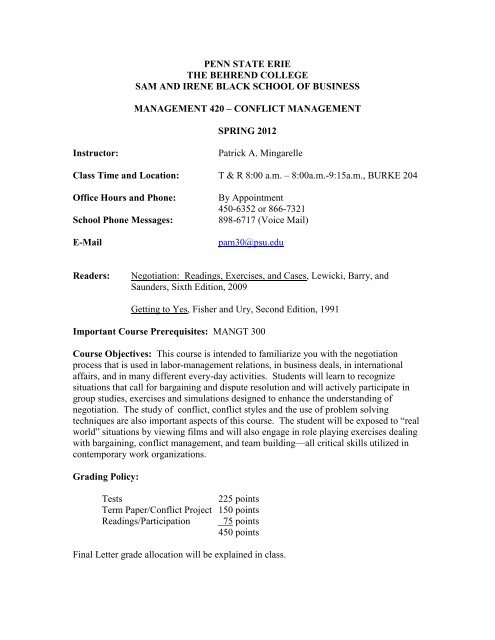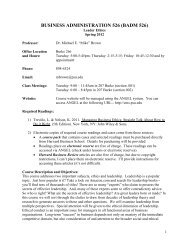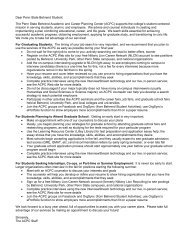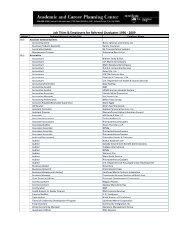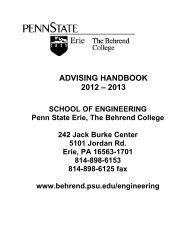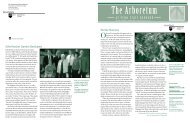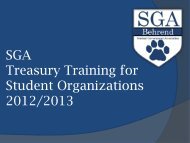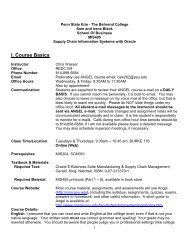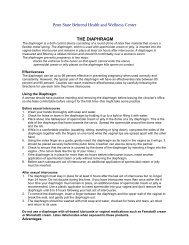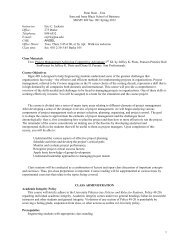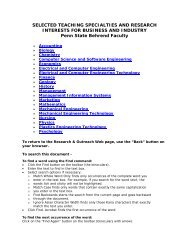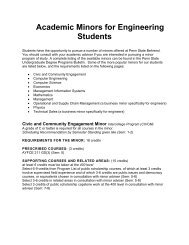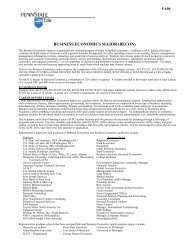MGMT 420 - (Patrick Mingarelle) - Penn State Erie
MGMT 420 - (Patrick Mingarelle) - Penn State Erie
MGMT 420 - (Patrick Mingarelle) - Penn State Erie
You also want an ePaper? Increase the reach of your titles
YUMPU automatically turns print PDFs into web optimized ePapers that Google loves.
PENN STATE ERIE<br />
THE BEHREND COLLEGE<br />
SAM AND IRENE BLACK SCHOOL OF BUSINESS<br />
MANAGEMENT <strong>420</strong> – CONFLICT MANAGEMENT<br />
SPRING 2012<br />
Instructor: <strong>Patrick</strong> A. <strong>Mingarelle</strong><br />
Class Time and Location: T & R 8:00 a.m. – 8:00a.m.-9:15a.m., BURKE 204<br />
Office Hours and Phone: By Appointment<br />
450-6352 or 866-7321<br />
School Phone Messages: 898-6717 (Voice Mail)<br />
E-Mail pam30@psu.edu<br />
Readers: Negotiation: Readings, Exercises, and Cases, Lewicki, Barry, and<br />
Saunders, Sixth Edition, 2009<br />
Getting to Yes, Fisher and Ury, Second Edition, 1991<br />
Important Course Prerequisites: MANGT 300<br />
Course Objectives: This course is intended to familiarize you with the negotiation<br />
process that is used in labor-management relations, in business deals, in international<br />
affairs, and in many different every-day activities. Students will learn to recognize<br />
situations that call for bargaining and dispute resolution and will actively participate in<br />
group studies, exercises and simulations designed to enhance the understanding of<br />
negotiation. The study of conflict, conflict styles and the use of problem solving<br />
techniques are also important aspects of this course. The student will be exposed to “real<br />
world” situations by viewing films and will also engage in role playing exercises dealing<br />
with bargaining, conflict management, and team building—all critical skills utilized in<br />
contemporary work organizations.<br />
Grading Policy:<br />
Tests 225 points<br />
Term Paper/Conflict Project 150 points<br />
Readings/Participation 75 points<br />
450 points<br />
Final Letter grade allocation will be explained in class.
Academic Integrity Policy All assignments, tests and term paper must be your own<br />
work. Excellence in scholarship is not achieved by dishonest practices such as plagiarism,<br />
submitting another student’s work as your own, cheating on exams, helping others cheat,<br />
and providing a false excuse for missing a class. Appropriate penalties will result with<br />
any discovered act of academic dishonesty.<br />
Tentative Semester Schedule<br />
(revisions will be announced in advance)<br />
DATE SCHEDULE<br />
01/10 Course Introduction and<br />
Introduction to Negotiating/Bargaining<br />
Lecture and class discussion<br />
Exercise: The Personal Bargaining Inventory, p.689<br />
01/12 Negotiating and Conflict<br />
Lecture and class discussion<br />
Readings: 1.1, 1.2, 1.3<br />
01/17 Negotiation Process and Bargaining Approaches<br />
Lecture and class discussion<br />
Readings: 1.4, 1.5, 1.6<br />
01/19 Bargaining Approaches - continued<br />
Lecture and class discussion<br />
Readings: 1.7, 1.8, 1.9<br />
01/24 Bargaining Approaches – conclusion<br />
Handout Exercise: Case Study<br />
Group/team assignments<br />
Readings: 1.10, 1.11, 1.12<br />
01/26 Individual Conflict Styles<br />
Lecture and class discussion<br />
In-class handout exercise<br />
Group/team assignments<br />
01/31 Organizational Conflict Styles<br />
Lecture and class discussion<br />
02/02 Conflict Styles – continued<br />
Film: A Case of Insubordination<br />
Group/team assignments – role play<br />
02/07 TEST #1
02/09 Interacting to Conflict<br />
Lecture and class discussion<br />
In-class handout exercise<br />
Group/team discussions<br />
02/14 Distributive Bargaining: Strategy and Tactics<br />
Lecture and class discussion<br />
In-class handout exercise: Group/team assignments<br />
Readings: 2.2, 2.3<br />
02/16 Distributive Bargaining – continued<br />
Exercise 4: team assignments<br />
Readings: 2.5, 2.6<br />
02/21 Integrative Bargaining – Strategy and Tactics<br />
Lecture and class discussion<br />
Exercise 7: team assignments<br />
Readings: 2.7, 2.10<br />
Getting to Yes I, II<br />
02/23 Integrative Bargaining – continued<br />
Analysis – converting from win/lose to win/win<br />
Film: Principled Negotiations<br />
02/28 Bargaining Simulation<br />
Analysis – converting from win/lose to win/win<br />
Exercise 17: In-class group/teams<br />
03/01 Bargaining Simulation – continued<br />
Analysis – converting from win/lose to win/win<br />
In-class group/teams<br />
03/05-09 SPRING BREAK – NO CLASSES<br />
03/13 Bargaining Simulation – continued<br />
Analysis – converting from win/lose to win/win<br />
In-class groups/teams<br />
Readings: 6.1, 6.2, Getting to Yes, III<br />
03/15 TEST #2<br />
03/20 Problem Solving Techniques<br />
Lecture and class discussion<br />
In-class handout exercise: group/team assignments<br />
03/22 Consensus Building
Film: 12 Angry Men<br />
03/27 Consensus Building – continued<br />
Film: 12 Angry Men<br />
03/29 Consensus Building – continued<br />
In-class handout exercise: group/team assignments<br />
Getting to Yes, IV<br />
04/03 Persuasion and Communication<br />
Lecture and class discussion<br />
Readings: 6.3, 6.4, 6.5<br />
04/05 Negotiator/Conflict Personality<br />
Lecture and class discussion<br />
04/10 Perception and Conflict<br />
Lecture and class discussion<br />
Film: The Eye of the Beholder<br />
04/12 Third Party Intervention<br />
Lecture and class discussion<br />
Film: Arbitration-7 Tests of Just Cause<br />
04/17 Third Party Intervention – continued<br />
Film: Mediating Negotiating Settlements<br />
Readings: 6.6, 6.7<br />
04/19 Turn in TERM PAPER<br />
Ethics in Negotiation<br />
Lecture and class discussion<br />
Readings: 2.8, 2.9<br />
04/24 TEST #3<br />
Global Negotiations<br />
Class discussion<br />
Readings: 5.1, 5.2, 5.4<br />
04/26 Getting to Yes<br />
Overall application to course<br />
Class discussion<br />
Term Paper/Conflict Project Analysis First Day Finals Week
POLICIES ON ATTENDANCE, PUNCTUALITY, LATE ASSIGNMENTS,<br />
DEFERRED GRADES, MAKE-UP EXAMS, ETC.<br />
Group activities and role assignments make active participation a fundamental part of<br />
this course. Excessive absences negate active and meaningful participation.<br />
Consequently, absences in excess of 3 times without prior approval or medial<br />
documentation will negatively impact your participation grade. You are also expected to<br />
arrive on time with every class meeting unless there is a legitimate reason for delay. Any<br />
late assignment or make-up exam must have my prior approval.<br />
PARTICIPATION:<br />
Your participation in class activities is vital to the success of this course. You are<br />
expected to actively participate in class discussions, exercises, simulations and role<br />
plays. Class participation is a significant part of your grade as indicated on this<br />
syllabus.<br />
READING ASSIGNMENTS:<br />
It is your responsibility to stay current with reading assignments and any written<br />
materials and analyses which are required from Negotiation: Readings, Exercises, and<br />
Cases and Getting to Yes as indicated on this syllabus. Contents from these sources may<br />
be included in tests. Failure to comply with these assignments will adversely affect your<br />
participation grade.<br />
TERM PAPER<br />
A number of options to be discussed in class will be given for the term paper assignment.<br />
Topics must be approved prior to the fourth week of class. Your paper should be an<br />
accurate report of the subject as well as an analysis relating to what you learned about the<br />
various aspects of negotiation and conflict management in the course. The suggested<br />
length for the paper is 5-8 double spaced single sided typewritten pages. It will be worth<br />
150 points toward your final grade and will not be returned.<br />
TESTS AND EXAMS:<br />
Three tests worth a combined total of 225 points toward your final grade will be given<br />
during the course.<br />
REVISIONS OR CHANGES:<br />
You are responsible for any material or schedule changes, including tests, discussed in<br />
class, even if you are absent.<br />
CAREER DEVELOPMENT CENTER<br />
The Career Development enter (CDC) can assist students with the process of career<br />
and life planning through a full range of programs and services. You may schedule<br />
appointments with the CDC staff to discuss issues including interests, skills, values, and<br />
goal setting, as well as how to find career information, internships, full-time jobs, and
graduate schools. You are encouraged to utilize the services of the CDC every year<br />
from your first semester to graduation.<br />
CDC Location: First Floor – Reed Building<br />
CDC Phone 898-6164<br />
CDC Web Site: http://pennstatebehrend.psu.edu/cdc


